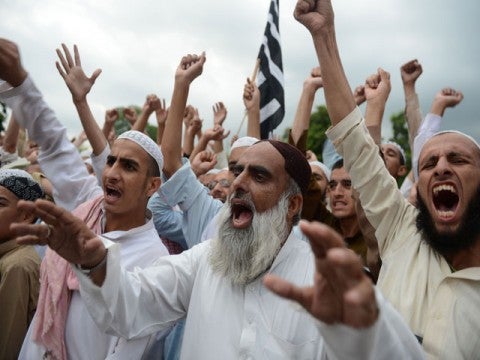This isn’t a case of ‘good’ Islam vs ‘bad’ Islam
Oversimplifying the causes of the riots is dangerous. Political upheaval has created a power vacuum in the Arab region and there are many who wish to fill it.

The Muslim protests, argued Tony Blair on the Today programme earlier this week, were a battle between the forces of modernisation “and those very powerful forces of reaction based on a perverted view of religion.” To which one can only say that if modernisation on our side means deliberately producing cartoons or films designed to provoke people into violent reaction, then you can count me out of it.
These riots have little to do with grand struggles over religious change and modernity. Still less are they “caused”, as the BBC persists in saying, by the anti-Muslim film made in California and posted on YouTube, although the French cartoon may incite a more direct response. They are happening because it is in the interests of particular groups or politicians to stir up trouble in this way.
It’s always been the same – whether you are talking of anti-Jewish pogroms, or Nigerian sectarian massacres or a girl’s bag being planted with burnt pages of the Koran in Pakistan. Incidents provide the occasion, not the cause, for public anger to be channeled for political or commercial ends.
In this case you have a whole Arab region where political upheavals have produced a vacuum of power that extremists are anxious to fill. There is nothing more that the Salafists of Egypt and Tunisia, or the fundamentalist groups in the Sudan and even Qatar, would like than an opportunity to gather the forces of fear among their own community and to force a break with the outside world that would turn their countries inwards. They must be utterly delighted by the reaction in the West to the riots.
But then the riots have equally played into the prejudices here among those who want to clamp down on immigration or, as in France, to impel integration. There is distrust enough already over the issue of headscarves. This only adds fuel to the sense of Muslims being savages with only hatred for us in their eyes, just as a French satirical magazine can sell out within hours for publishing intentionally insulting cartoons of the Prophet.
Those who see conspiracies in the rise of Muslim political groups accuse Egypt’s Muslim Brotherhood’s President Morsi of orchestrating it. But Morsi, in calling for nationwide protests, seems if anything to be trying to recapture the political initiative for fear of being outflanked by the more extreme and still banned groups. So too with Tunisia, Sudan and elsewhere. It is the marginalised groups, most of them excluded from the democratic process, not the established ones, that have the interest in stirring things up.
Tony Blair, with an interest in promoting his own role and that of his inter-faith foundation, would have this as a conflict between moderation and extremism within Muslims in which the West can act to promote the one against the other. But this is to misunderstand the situation. The rise of conservative religion in the Islamic world is being led as much by the educated young as it is by the less well-educated old.
Islam has the political weakness of being largely unstructured, unlike Christian churches. But it has the strength of a common language and universal belief. Adopting the habits of an outwardly sober religious devotion is a route to belonging and a way of restoring pride. Non-religious countries do this through nationalism whereas the Arab nationalism of the post-colonial era is felt to have failed in a mire of corruption and genuflection to western intrests.
The last thing the West should be doing at this moment is talking of “good Islam” against “bad Islam” or making this into a religious conflict. It isn’t. It’s the reflection of a feeling among Muslims, here as in the Middle East, that the past has failed them, and that they need to recover their self-belief, without provocations from a West which has does so much to damage them in the past.
Join our commenting forum
Join thought-provoking conversations, follow other Independent readers and see their replies
Comments